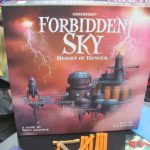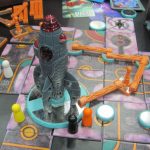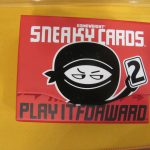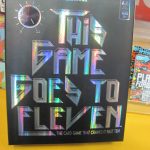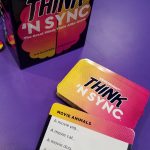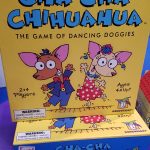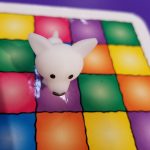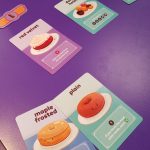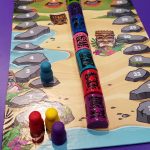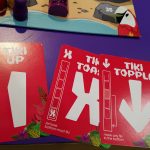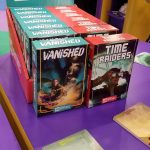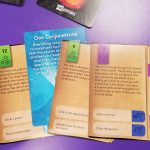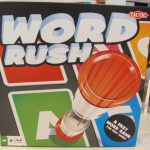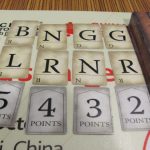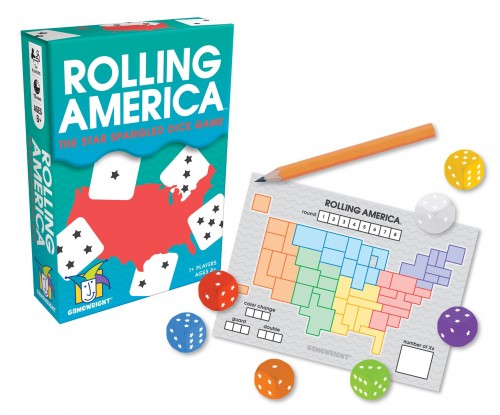 At Gen Con, Gamewright debuted Forbidden Sky ($40), a much-anticipated sequel to Forbidden Island and Forbidden Desert. Also a cooperative game, Forbidden Sky is set on a platform floating in a storm. While the winds blow their pawns about, the players must construct a circuit to bring power from lightning rods to an escape rocket. The game is electrified, the circuit is real, and the rocket lights up when the players succeed.
At Gen Con, Gamewright debuted Forbidden Sky ($40), a much-anticipated sequel to Forbidden Island and Forbidden Desert. Also a cooperative game, Forbidden Sky is set on a platform floating in a storm. While the winds blow their pawns about, the players must construct a circuit to bring power from lightning rods to an escape rocket. The game is electrified, the circuit is real, and the rocket lights up when the players succeed.
Other recent additions to the Gamewright’s lineup include Sneaky Cards 2 ($10), with more actions to play on the street and with strangers, This Game Goes to Eleven ($15, Target exclusive), a family game of sticking others with your cards, and Trash Pandas ($13), a push-your-luck game, where the players are raccoons collecting scraps from garbage cans.
- Comments Off on Gen Con 2018—Gamewright
Hot Jobs
28 Sep
Posted by David Miller as Card Games, CCGs, Miniatures, Modern Board Games, RPGs, War Games
 To support its fast-growing catalog, Renegade Game Studios seeks a Localization Coordinator (in Europe, to support European partners), a Marketing Coordinator (in North America, to support brand-building and social media), and a Game Producer (in San Diego, to push the development of new products).
To support its fast-growing catalog, Renegade Game Studios seeks a Localization Coordinator (in Europe, to support European partners), a Marketing Coordinator (in North America, to support brand-building and social media), and a Game Producer (in San Diego, to push the development of new products).
In addition to a number of jobs related to its digital products and a few art-related positions (contract and in-house), Wizards of the Coast is recruiting for a Principal Product Designer. This job involves overseeing R&D design for Magic: The Gathering. Responsibilities include managing all aspect of a MtG block, contributing to strategic development and decision-making, and otherwise supporting the MtG brand.
Two positions are open at Paizo. One is for a Game Developer “to take responsibility for the creation, revision, and editing of content for… the Pathfinder Roleplaying Game, Starfinder, and associated product lines.” The other is for a Customer Service Representative to answer inquiries and troubleshoot problems.
Pelgrane Press has an opening for an Administrative Assistant but it’s no mere secretarial position. The job involves working with directly with customers, online and in-person, as well as managing supply-chain issues such as print buying and tracking warehouse inventories. Pelgrane is headquartered in the U.K. but remote work is OK. The work is estimated at 25 hours per week for a salary of US$1,500 per month (about $14/hr, no benefits).
Games for Change (G4C), the organization that promotes driving real-world change using games, has three openings: Senior Director (an executive leadership position), Community Manager (a part-time but front-line, point-of-contact between G4C and the whole range of its stakeholders), and Operations Manager (also part-time, and responsible for office and financial management, and maintaining institutional knowledge). All three are based out of New York City.
Ceaco (Gamewright) is looking for a Stock Room Assistant, part-time in Newton, Massachusetts.
At Lost Battalion Publishing in Upperco, Maryland there are openings for a full-time Graphic Designer and a part-time Game Manufacturing Technician.
- Comments Off on Hot Jobs
 At the Mensa Mind Games this past weekend in the Virginia suburbs outside Washington, DC, member judges played through and selected the following games as 2017 Mensa Select winners:
At the Mensa Mind Games this past weekend in the Virginia suburbs outside Washington, DC, member judges played through and selected the following games as 2017 Mensa Select winners:
Amalgam from Simply Fun—A game in which the players, as wizards, try to collect sets of potion ingredients but have to rely on their memories of the ingredients they’ve already collected.
Around the World in 80 Days from Iello Games—A Spiel des Jahres winner from years ago (Hare & Tortoise), reproduced based on the Jules Verne novel. Players race around the board, moving forward and back as they wish. However, they must carefully plan to arrive back in London with the least amount of cash left in hand.
Clank! from Renegade Game Studio—A dungeon delve fantasy adventure game built on deck-building mechanisms.
Harry Potter Hogwarts Battle from USAopoly—Another deck-building game, this one follows the novels with a series of cooperative games that get more complex and more difficult to beat as they progress.
Imagine from Gamewright—A party game where the giver-of-clues chooses an item from a card and then tries to illustrate the item by combining images and symbols with an overlay of transparent cards.
- Comments Off on 2017 Mensa Select Winners
 One of of the larger booths I visited at Toy Fair was Gamewright. Several small games were on display as were some games that are about to return to your game store’s shelves.
One of of the larger booths I visited at Toy Fair was Gamewright. Several small games were on display as were some games that are about to return to your game store’s shelves.
In the Port-A-Party line of small games, they had Think ‘n Sync and PDQ, both available in March for $10. PDQ, which we’ve discussed before, has been out of print for five years and returns in a box sized to fit in the Port-A-Party line. In that game, three letter cards are placed in a row and players race to create a word using those letters either left-to-right or right-to-left. Think ‘n Sync is a game that reminded me a bit of Family Feud, except everyone shouts out their answer. Matches gain points.
Rory’s Story Cubes, Fantasia edition, is on its way for a summer release ($8). Fantasia contains three Enchanted dice, three Myth dice, and three Medieval dice.
Cha-Cha Chiahuahua (summer, $16) comes with a bunch of little doggie figures and several disco dance floors for kids 4 and up. Do activities and place your dancing pups on the color-coded dance floor.
Go Nuts for Donuts (summer, $15) is a Sushi Go-like game with bidding instead of drafting. Donut cards are laid out and you select which one to add to your collection; if others are also going for your choice, you all lose out. Each type of donut has different abilities, such as a point reward for having the fewest cards, ability to steal donuts from the discard pile, or a significant number of points for having a large collection of one type.
Imagine (now, $15) is charades with clear cards. Transparent cards with symbols printed on them are layered atop one another to create images others have to guess. A clever way to use see-through cards. Can you tell what’s on the center of the box above?
Tiki Topple (summer, $20) is a reprint of a ten year old game. This new Mensa Select edition has players trying to assemble a totem pole with certain tiki heads nearest the top. Cards that reorder and remove some sections of the pole are used to move your sections up and opponents’ down. But can you tell which tiki heads your opponents are trying to get to the top? It’s a quick game that I really enjoyed playing a demo of — it reminded me a bit of Abandon Ship, but with simpler and shorter gameplay.
This summer, two new entries into the CardVentures line, Vanished and Time Raiders (each $10), will be released. These choose-your-own-adventure-like games join last year’s Stowaway 52 and Jump Ship!. The single-player game is played with oversized cards with story elements, allowing you to jump to additional cards based on your choices to tell a story.
- Comments Off on Toy Fair 2017—Gamewright
PAX East 2017—Tabletop Hall Exhibitor List
07 Mar
Posted by Thomas Deeny as Card Games, CCGs, Classic Board Games, Modern Board Games, RPGs
 Attending PAX East and want to know who is exhibiting at what tables? We’ve been given the list of exhibitors in the tabletop hall, which currently do not show up in the Guidebook app, the only version of the program and show’s floorplan available.
Attending PAX East and want to know who is exhibiting at what tables? We’ve been given the list of exhibitors in the tabletop hall, which currently do not show up in the Guidebook app, the only version of the program and show’s floorplan available.
The tabletop booths will be along the right (north) edge of the space, near the skybridge. From the main Queue Room entrance on up to the Lenovo Legion PC Room, the following companies will have a presence in the tabletop hall:
- Gamewright, Q-Workshop, Asmodee NA
- Compleat Strategist (local game store), Steve Jackson Games
- Battleground Games & Hobbies (local game store), Level Up Dice, Fun to 11, Tectonic Craft Studios
- CMON, Wyrmwood Gaming
- Burning Wheel, Japanime/Global Games Distribution, Greenbriar Games
- Modern Myths NY (“local” game store), Armor Class 10 Shirts
- Pandemonium Games (local game store), Crit Success, Dragoon/Lay Waste Games
- Atlas Games, United States Professional Mahjong League
- Drinking Quest, Aviary Games, SFR
- AdMagic
- Greater Than Games
- Foam Brain Games (“local” game store)
Although the PAX 2017 program book that appears in the Guidebook app doesn’t break down the tabletop hall, PAX’s Tabletop Manager has said that this year a detailed map of the tabletop area will appear in the program.
Decks and Decks of Cards with Letters
28 Feb
Posted by Thomas Deeny as Card Games, Modern Board Games
 At Toy Fair, we stopped by Set Enterprises (maker of Set, Five Crowns, and Quiddler) to look at their new game, WordSpiel. WordSpiel, like Quiddler, consists of a large deck of cards — 110 of them — with each card featuring a letter. Unlike Quiddler, the game also comes with a sixty-second timer.
At Toy Fair, we stopped by Set Enterprises (maker of Set, Five Crowns, and Quiddler) to look at their new game, WordSpiel. WordSpiel, like Quiddler, consists of a large deck of cards — 110 of them — with each card featuring a letter. Unlike Quiddler, the game also comes with a sixty-second timer.
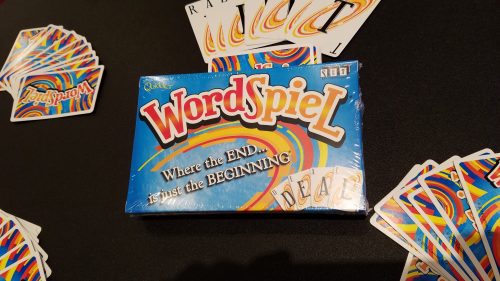
Here’s how it goes: we start with one letter card face-up. Each player gets ten letter cards and on their sixty-second turn, they play a word starting with the last letter(s) shown. So if the ever-growing spiral of cards reads STEP, the next player could play R, I, E, S, T for the word “priest”, and the lineup now looks like STEPRIEST. Then the next player could play R, A, N, D for the word “strand” using the ST at the end the spiral, and we’ve got STEPRIESTRAND.
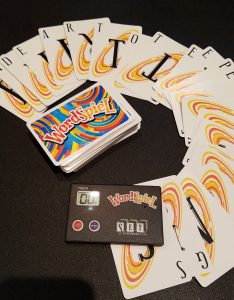 When it’s not your turn, you can discard up to three cards from your hand, drawing replacements. If the timer goes off — there’s a ten second warning beep — the player has to draw a card and either place it at the end of the spiral or add it to your hand. Get rid of your cards and you win, everyone else gets as many points as they have cards left in their hand.
When it’s not your turn, you can discard up to three cards from your hand, drawing replacements. If the timer goes off — there’s a ten second warning beep — the player has to draw a card and either place it at the end of the spiral or add it to your hand. Get rid of your cards and you win, everyone else gets as many points as they have cards left in their hand.
We played a three-player game and either were able to play cards right away or we realized we had nothing to play, also right away. We never went below forty seconds on the timer — even the ten year old didn’t — and we did have to adjust our hands a bit to find those elusive letter combinations to make something fit. But we never really needed the timer.
Overall a fun, quick game. The rules say the winner is the player with the lowest total score after five rounds, but three rounds was enough for us. I would recommend playing as many rounds as there are people playing.
WordSpiel was released in the past few days, so your store should have it now or shortly. It retails for $13.
Now, it’s my thought that a game deck featuring letters instead of numbers or pips needed something aside from just the rules one uses with the deck to make a game. For instance, there were four other new or re-issued games at Toy Fair we saw that used the same basics: a deck with letter cards. And there was also Quiddler at the same booth.
Playroom Entertainment’s Unspeakable Words also comes with little Cthulhu pawns. It’s one of many “make words with these letter” games, but this game has scoring based on the number of angles in the letter instead of rarity, and allows you to make up words with random letters if you go insane. A re-issue of the game in slightly different box is expected in May at a $25 retail price. Unspeakable Words has 96 letter cards.
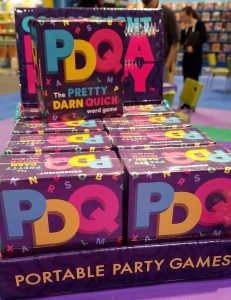 PDQ from Gamewright is another re-issue, having been out of print for five years. The game finds itself as part of the small box Port-A-Party line (all games in this line are $10 retail) as just a box of 78 letter cards. Throw three cards down and try to make a word out of them either left-to-right or right-to-left. The letters N K B come out. Did you shout out “unknowable” before someone else called out “broken”? Then you grab those three cards and keep them as points. PDQ will be available in March.
PDQ from Gamewright is another re-issue, having been out of print for five years. The game finds itself as part of the small box Port-A-Party line (all games in this line are $10 retail) as just a box of 78 letter cards. Throw three cards down and try to make a word out of them either left-to-right or right-to-left. The letters N K B come out. Did you shout out “unknowable” before someone else called out “broken”? Then you grab those three cards and keep them as points. PDQ will be available in March.
(We wound up playing PDQ with our WordSpiel deck. The girl took the deck to school for after-class game club on Monday and just wound up playing PDQ with it, over and over.)
Tactic Games USA is bringing out Word Rush in June for just $20. Draw one of the fifty topic cards and name a word in that topic that begins with one of the nine letter cards shown. (100 letter cards in Word Rush.) Flip a sand timer and put it on the letter used. Now the next player has to name something that fits the topic starting with one of the eight other letters before the sand timer runs out. If they do, they flip and move the sand timer. So there’s some strategy in how you use the time available in addition to just naming words.
- Word Rush
- Word Rush
- Wordsy
Or maybe you’d like Wordsy from Formal Ferret Games? That’s a reimplementation of Prolix by the same developer, but now uses 60 letter cards instead of chips. In Wordsy, you lay out eight letter cards in two rows, with each column of two cards assigned a point value from 2 to 5. Everyone searches for a single word that uses a lot of the letters shown; the first one to commit a word flips the sand timer, gaining a point to do so. And then, scoring. For the letters in the above photo, the word LEARNING would earn 19 points while the word GARBAGE would earn just 10. Wordsy will be out in June for $20.
You know, that looks like fun. We might give that a play with our WordSpiel deck.
A copy of WordSpiel was provided free for review by Set Enterprises.
- Comments Off on Decks and Decks of Cards with Letters
 I noticed more family game companies showing up at Gen Con. Gamewright was one of those that hadn’t had a presence in several years. This time, though, the company was right in the Family Fun Pavilion with a debut of Imagine ($15, now). It’s a party game where the giver-of-clues chooses an item from a card and then tries to illustrate the item by combining images and symbols with an overlay of transparent cards. Besides the clue-giver’s artistic abilities, helping the rest around the table to guess the item is at least they know a category.
I noticed more family game companies showing up at Gen Con. Gamewright was one of those that hadn’t had a presence in several years. This time, though, the company was right in the Family Fun Pavilion with a debut of Imagine ($15, now). It’s a party game where the giver-of-clues chooses an item from a card and then tries to illustrate the item by combining images and symbols with an overlay of transparent cards. Besides the clue-giver’s artistic abilities, helping the rest around the table to guess the item is at least they know a category.
- Comments Off on Gen Con 2016—Imagine from Gamewright
Hot Jobs in the Game Industry
02 Aug
Posted by David Miller as Card Games, CCGs, Electronic Games, Modern Board Games, RPGs
Would you like to be the primary person responsible for the Monopoly brand or help preserve games for museum archives or develop the digital version of a popular card game?
At Hasbro, the numerous open jobs include Senior Director of Global Marketing (“define and drive the global strategy for Family Gaming”), Design Manager (supervise technical design development efforts for a games category product line), and Product Designer (for “Phygital Games” combining physical and digital products). Subsidiary, Wizards of the Coast, is looking for, among others, a Director of Competitive Gaming and eSports for Magic: The Gathering, a Game Designer fluent in Japanese for Duel Masters, and a Principal Product Designer to oversee MtG R&D efforts and “develop strategic direction for block environments.”
Spin Master wants to hire a Public Relations Coordinator to manage outreach to press and a Senior Copywriter to author marketing materials.
Mattel has three Senior Designer positions open in the Boys Toy Box team for people with “a passion for action figures and/or game design.” Also positions for a Sr. Manager Digital Marketing and a Digital Producer.
ThinkFun is looking for a Product Manager and a Senior Product Manager to help organize the company’s projects, keep them moving forward, and manage quality.
Among the people that The Strong (National Museum of Play) is looking for are a Director of Conservation (to preserve games and toys in its collections), a Project Cataloger (to digitize and inventory games and puzzles), and a Teaching Host (to work with visiting school groups).
Ceaco (A.K.A. Gamewright) needs a Sales & Marketing Coordinator to assist with accounts, prepare marketing materials, and analyze sales data.
White Wizard Games (Star Realms) has an opening for a Digital Deckbuilder, that is, someone with experience in server-side apps and “a passion for card games.”
Thames & Kosmos needs a Purchasing & Planning Coordinator for analyzing sales data, managing inventories, and working with suppliers.
TOMY (Battroborg, Mr. Mouth) is recruiting for several positions: Brand Assistant, Digital Merchandising Manager, and Legal & Marketing Coordinator.
Toobeez (U.S. distributor of Funskool games from India) seeks a Junior Sales and Marketing Executive to help with social media, email marketing, and specialty retailer support.
The Toy Industry Association needs a Communications Specialist/Content Developer and a Director of Audience Relations. Both positions have a fair amount to do with New York Toy Fair.
Toyjobs is a specialty recruiter for the toy industry.
- Comments Off on Hot Jobs in the Game Industry
According to the four color map theorem it requires no more than four colors to fill in any map while making sure that no adjacent areas share the same color.
Working off a similar principle is the newest release announced by Gamewright. In Rolling America, each player attempts to fill a map of the United States with the numbers rolled on a set of colored dice. The challenge, though, is that the numbers in adjacent states may not differ by more than one. Any time a player finds it impossible to write a die’s number in a state with a matching color, they must instead fill one of those states with an “X”. At the end of the game, the player with the fewest Xs is the winner.
Rolling America is based on a similar game previously released in Japan and is scheduled to hit retail this fall at a suggested price of $11.
- Comments Off on Rolling America, the Dice Game for Map Fans
 The annual Mensa Mind Games took place this weekend in San Diego. There, 325 judges played through 60 different games to choose the following Mensa Select Winners:
The annual Mensa Mind Games took place this weekend in San Diego. There, 325 judges played through 60 different games to choose the following Mensa Select Winners:
Dragonwood—A push-your-luck game of rolling dice and capturing fantastic creatures. Players may also along the way attempt to grab enhancements but when the two dragons are gone the game is over. [Published by Gamewright.]
Lanterns: The Harvest Festival—Which pairs set-collecting and tile-laying as players build floating displays of paper lanterns for the emperor of China. [Designed by Christopher Chung. Published by Renegade Game Studios and Foxtrot Games.]
Castles of Mad King Ludwig—Another tile-laying game, in which players attempt to build the most extravagant castle for the king. [Designed by Ted Alspach. Published by Bezier Games.]
Letter Tycoon—A word game in which players can also purchase letters and then charge other players to use them. [Designed by Brad Brooks. Published by Breaking Games.]
Trekking the National Parks—Which combines card play, a national map to track movement, and details specific to each of the 59 U.S. national parks. [Designed by Charlie Bink.]
- Comments Off on 2015 Mensa Select Winners
Trending
- Massdrop.com
- Oh the Irony—Illuminati Card Game Continues to Inspire Conspiracy Theorists
- Footprints, an Educational Ecology Game
- Home
- USPS Adds Board Game Flat Rate Box
- Baila, the Estonian Drinking Card Game
- Crystal Caste Wins Dice Patent Suit Against Hasbro
- Mirror Game, Red and Blue
- Are Board Games Dangerous?
- Board Games Based on Hindu Mythology
Archives
Most Popular Articles
- Oh the Irony—Illuminati Card Game Continues to Inspire Conspiracy Theorists
- The 20 Most Valuable Vintage Board Games
- The Truth About Dominoes On Sunday in Alabama
- Sequence Game, and Variants
- USPS Adds Board Game Flat Rate Box
- Baila, the Estonian Drinking Card Game
- The 13 Most Popular Dice Games
- Are Board Games Dangerous?
- Guess Who? The Naked Version
- What Happened to the Jewel Royale Chess Set?
Recent Posts
- Toy Fair 2019—Breaking Games
- Talisman Kingdom Hearts Edition
- Toy Fair 2019—Winning Moves
- Toy Fair 2019—Games Workshop
- Toy Fair 2019—Star Wars Lightsaber Academy
- Toy Fair 2019—Stranger Things Games
- Toy Fair 2019—HABA
- Licensing Roundup
- Game Bandit
- 2018 A Difficult Year For Hasbro But Not For D&D Or MtG
Recent Comments
- on Toy Fair 2019—Winning Moves
- on Game Bandit
- on Second Look—Dungeons & Dragons Waterdeep Dragon Heist
- on Crowdfunding Highlights
- on Beyblade SlingShock
- on Game Bandit
- on Game Bandit
- on Watch This Game!, the Board Game Review Board Game
- on Second Look—Vampire: The Masquerade 5th Edition
- on Palladium Books Loses Robotech IP License, Cancels Five-Year-Overdue Robotech RPG Tactics Kickstarter

